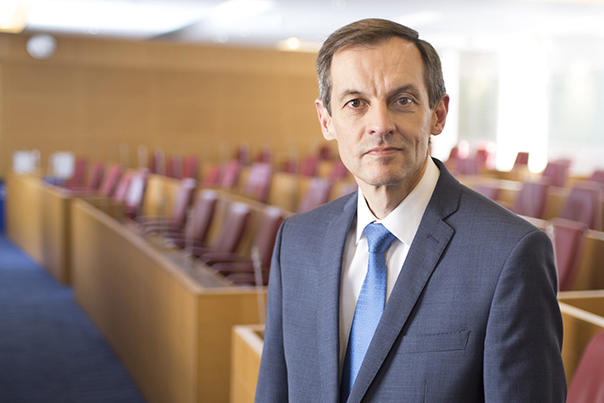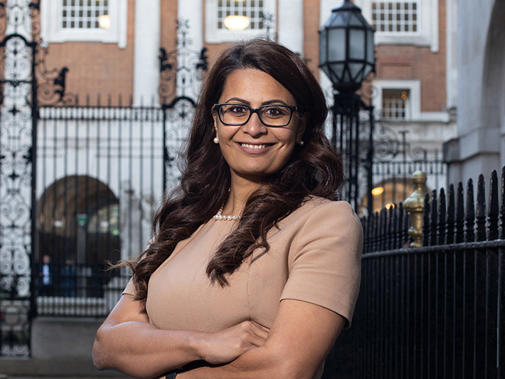‘It’s a huge privilege. But it is also a huge responsibility – and there is a great weight on your shoulders.’ Farah Jameel is under no illusions about the scale of the task ahead, nor the importance of the moment.
The new chair of the BMA England GPs committee has been met with a to-do list of some length – an in tray with a seemingly endless list of items marked urgent.
Another wave of the COVID-19 pandemic means GPs have been asked to step up again to lead the vaccine programme: the dwindling workforce and soaring workload has left doctors exhausted and the Government has failed to provide the meaningful support which could transform services and patient care.
Perhaps most pressingly of all GPs across the country feel burned out – having given so much to patient care and the vaccination programme during the pandemic only to find themselves victims of smear campaigns from the media and tone-deaf communications and policy from Government and national NHS leaders.
‘We are angry, disappointed and upset,’ Dr Jameel says. ‘Despite pouring their hearts and souls into looking after patients – and make no mistake it is heart and soul – it feels we have had no recognition from the Government.’
Extreme pressure
Dr Jameel, who has worked in practices across the country from Surrey to Filey, and Brighton to London, has felt the strain personally, as so many others have.
‘As someone who, like most of my colleagues, came into this profession to care for our communities and advocate for our patients, I have found recent months and years increasingly difficult,’ she says.
‘A decade of austerity combined with the incredible challenges of this pandemic have left us with our hands tied and our options diminished. Like so many of my colleagues I face regular dilemmas over how much time to give to patients who need mental health support, social care or the dedicated expertise of public health services but can only make an appointment with their GP.
'Often it feels like we are the only people, the only professionals, on hand to lend an ear, to have a conversation or to try to help. The pressure of feeling so needed but having countless consultations every day – each a human being with their own unique story – can be genuinely crushing.’
The pressure of feeling so needed but having countless conversations every day ... can be genuinely crushingDr Jameel
 Richard Vautrey
Richard Vautrey
Dr Jameel follows Leeds GP Richard Vautrey in the role. Dr Vautrey stepped down in November having been chair for four years and part of the GPC negotiating and executive teams since 2004.
Paying tribute to his work, Dr Jameel says: ‘Richard sacrificed his entire life in the dedication to improving the working lives of GPs and, through that, improving the services for patients across the country. He is an extremely hard-working individual, a thoroughly decent human being, who has continually and robustly made the case for GPs, practices, services and patients.’
Dr Jameel’s arrival in the role coincided with a decision having been made to survey the profession in the face of the extreme difficulty GPs were facing.
The indicative ballot gave one vote to each practice with a GP partner who is a BMA member. The window for this process gave practices just two weeks to respond, yet returned a turnout of 35 per cent.
The ballot revealed the frustration and difficulties staff face. Eighty-four per cent of respondents said they would welcome non-compliance with COVID exemption certificate requests, 80 per cent said they would change the way they reported appointment data, 58 per cent said they would support withdrawal from the PCN (primary care network) DES (direct enhanced service) at the next opt-out period and 39 per cent said they would be willing to disengage from the PCN DES before the next opt-out period.
In a speech to the profession at the English local medical committees conference last November, Dr Jameel, who came to the UK from the UAE in 2007 ‘in search of a genuinely equitable health service’, said: ‘Make no mistake.
This is a profession on its knees, and ready to fight for its existence.’ If election as new GPC leader was not enough to ensure a focus on new priorities, the results of the ballot have further crystallised Dr Jameel’s instincts to look to the future and, crucially, to find solutions to the problems the profession faces.
Dr Jameel says rebuilding the workforce and placing well-being at the heart of everything are central to the work she wants to do. And alongside those priorities she intends to focus on giving GPs ‘time to see the patients who need them the most, time to lead their teams and time to keep up to date with progress in healthcare and to innovate’.
Urgent action needed
Dr Jameel also intends to use data to explain more powerfully the work GPs are doing in their communities in a bid to alter negative narratives from media and Government.
All of these priorities come together around one primary focus. Dr Jameel says: ‘What really matters in general practice is how we can be empowered to look after our communities, really make a lasting difference to outcomes – improving their lives and lifting them up. We have such a significant role to play in shaping the health of our nation, but for this to happen we need to embed the right culture, commit appropriate support, provide the right infrastructure and create the right environment that will allow general practice to thrive and grow.’
It is time for ministers to demonstrate the sort of care and compassion we doDr Jameel
In that LMCs conference speech, Dr Jameel said ‘the profession has had enough’ and that ‘relationships are broken and trust has been lost’, before telling colleagues that ‘enough is enough’.
Years of under-investment, a lack of care and the brutal experiences of the pandemic have left general practice on its knees. And, for Dr Jameel, urgent action is required immediately.
Addressing the Government, Dr Jameel says: ‘It is time for ministers to demonstrate the sort of care and compassion we do – and are expected to do – on a daily basis by listening to the profession, understanding our struggles and showing appreciation for everything we have done.
'I want to offer the Government the chance to work together to build general practice back better.’ Speaking to the profession, Dr Jameel says: ‘I will make the case for general practice and I will do that in a way that carries our patients at the heart of everything we do.’

